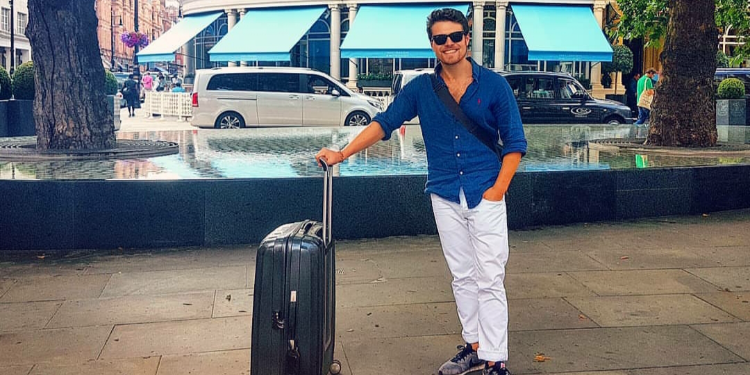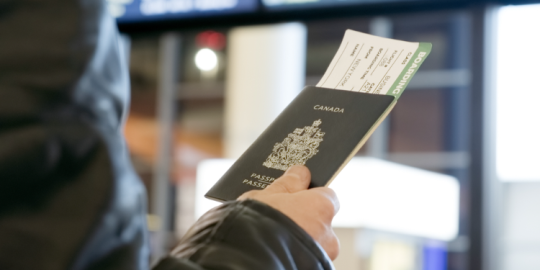Tell us a little bit about you.
My name is Pyotr, and l am from the UK and Russia. Regarding my background, at the risk of sounding dramatic or grandiose; but l am a product of the Cold War. My parents met in Soviet Russia when my English mother, in her young 20s, decided to take the risk to visit this strange, infamous, even ominous land.
Fascinated by art, history and classics, she met my Russian father, a nuclear physicist in Moscow metro, due to an elderly lady taking pity on my mother and her friend. That lady happened to be my father's mother-in-law, and so she unknowingly introduced her son-in-law to the woman who would sadly end her daughter's marriage.
That was in 1982, but my parents weren't together until 1990 but stayed in contact by writing letters to each other involving different embassies - completely illegal during those days. I actually wrote all about this in an article on my website: myglobalmuse.com. I say all this because l think its these events which shaped me into who l am and where l am.
Where do you live currently, and what brought you there?
Since 2018, l am based in Dupont Circle, Washington DC, only a 10-minute walk from the White House. l have been here throughout some major events, especially since 2020, including Black Lives Matter movements, the US election, Biden's victory, and the January 6th Capitol Insurrection. Again,l mention all this because its contemporary social, political or environmental issues that brought me to Washington in the first place.
Having completed my undergraduate in the UK, some of which was spent in Australia, l settled on doing my postgraduate abroad. Eventually, l settled on Johns Hopkins, which has a specialist International Relations with a campus in Italy. So l moved to Bologna for a year before moving to Geneva to work in the UN briefly, and then finally coming to Washington DC.
I graduated in mid-2019 and have since worked in Washington at the World Bank, Amnesty International, International Rescue Committee and right now International Crisis Group on various global issues, including a lot that focused on Covid-19.
My longer-term goals are to work in the areas of climate change, security, human rights and other transnational challenges, especially in the UN.
When did you decide that you'd rather live abroad, and for what reasons? In which countries have you lived and travelled?
I had always intended and knew l would live overseas at some point but never been set on when. So coinciding it with completing an advanced degree just seemed logical and some wise life planning.
I never had a specific epiphany that l knew l wanted to live abroad and where. But l have been fortunate enough to have travelled a lot. And that made me really appreciate how diverse the world is and to learn how it all interacts. Plus, as I entered my mid-teen years, 15/16, l was maturing and increasingly thinking about what l wanted to do, to specialise in; my parents also encouraged me to look at what would follow school.
So, it was a combination of various factors: firstly, my sense of adventure and inquisitive personality - l love to learn; secondly, the fact l wanted to do something naturally connected to travel and the world; thirdly, that it would be best for me personally, academically and professionally; fourthly, as l wanted to make a difference, and lastly, and equally cliche, because you only live once and what is the hell is the point of spending it all in one place?
As for where l have travelled and lived, l feel that distinguishing between those is important too! How long do you've need to have stayed in one place to say you're expat? How does an expat differ to a nomad or an immigrant? Questions like that l found very interesting and are partially what pushed me to study population studies or demographics, where migration is a major component.
To be reasonable, l would say l've lived in 6 countries now: the UK, Russia, Australia, Italy, Switzerland and the US. As for travelling, again you could be cheeky and say you went somewhere merely because you were in that country's airport for hours during transit... l don't count that. So, around 80 now. I had aimed to reach 100 before l turned 30. Then Covid-19 happened.
Visiting a country like Kazakhstan as your first is quite unusual. Do you think that influenced you and your travelling?
I went to Kazakhstan when l was only six months old. So, l would say it was pretty uneventful since l was so young to really get anything out of it or even really remember it. That said, the fact it was my first country, followed by Antigua, definitely gave me a taste for the more exotic, rugged landscapes out there. And l also started visiting my grandparents in Novosibirsk, Siberia, which though a major Russian city, was still very remote. This expanded into me staying with them for weeks at a time in the summer, so I guess you could say that was technically my first official time living abroad.
Even though l was so young, l am certain that these experienced stuck with me and appreciate the diversity of different locations, how people live, and how they interact. My parents would go to some of the most remote areas of the globe (don't worry, they were attentive parents), and this made me very curious as to where they went, what it was like, and that l wanted to do the same. This was the early-mid 1990s - you had decent video or photography, and the internet had just become a thing, and there was still a sense of mystery or fascination about these countries or locations that had just become independent or even existed.
There wasn't any Instagram or so much interlinkage, and there was some authenticity that remained about being able to genuinely discover places. No influencers, no superficiality, or only showcasing the most marketable, sellable destinations.
Unquestionably, l have an appetite for the unusual or the different. If most people go there or do that, then l will do the opposite. Not to be contrary, but because experience has taught me you're often better off going against the herd, and that includes travel. Also, I think many people, especially in western countries, and those who've travelled very sparingly, can develop very misguided or just plain wrong preconceptions about other countries or cultures based on what they read or hear on TV.
The amount of times l encounter people who have predefined ideas about foreign places is surprising. Or when people have told me I shouldn't refer or joke about the customs of, say, Russia when they haven't ever been there, and so have no idea just how accurate, usually funny, most stereotypes can be. So, absolutely, travelling to these unusual places at such a formative stage of life left an impression. It really made me value the unparalleled impact of first-hand experiences and that many stereotypes or conceptions about countries or their people can be so accurate.
The most well-rounded, informed, fascinating and self-content people l always met are those who have lived or worked abroad, at least briefly. Getting out of your comfort zone is a must in all of life, especially with travel.
What has been your best experience so far as an expat?
That is a very simple question, yet extremely complicated one to answer! Each place l have lived had something to offer, plus the duration of each varies, which limits how much you can do in each place.
It sounds unusual, but Australia was impactful because it really hammered home the importance of work-balance to me. It made me consider what l really value in life and what l, alongside what everyone should aim to do at some point: self-reflect and prioritise on their shorter versus longer-term goals. Obviously, this isn't set in stone, but premise is to take significant moments like living abroad to consider your priorities in that nearer moment versus perhaps in a few years.
I'm making it sound scary probably - simply use it to get to know yourself more and not only what you want in life, but how you could go about realising. Alternatively, it would be being part of the boat parade that goes under Sydney Harbour Bridge during New Year's Eve before then floating on the water to observe the surreal firework display isn't something l will be able to replicate!
Other than that? Living in Italy and consuming ghastly amounts of vino and pizza.
What is being an eco expat all about? What are the difficulties of being an eco expat?
What l mean by being an eco-expat is trying to live more sustainably while overseas or being nomadic. So, inevitably, if you live abroad, you'll likely be more transient, travelling between places for work, seeing your family, and exploring the new place you live. But with that comes a lot of unsustainable, non-environmental choices or activities like flying a lot or consuming products in ways that other people don't.
So, since l have lived in the US, l have realised just how poor the public infrastructure is outside of some major cities like New York or Washington DC. If you want to go anywhere, even local, you need a car. It puts into perspective how spoilt Europe is with so many reliable train or bus networks.
The biggest difficultly has been balancing wanting to visit all over the US, but then adding to my carbon footprint. I get a lot of stick from people that l cannot be eco-friendly while wanting to travel. I fundamentally disagree. While l am bias to the 90s - all that nostalgia, nowadays we are so fortunate to have access to technology and knowledge that wasn't imaginable when l was a kid. So though it's tricky being truly ‘eco' as an expat, it's a damn sight easier.
Otherwise, its smaller, specific challenges like trying to only eat food that is locally produced and in-season. Or by being more targeted in my purchases, so l only buy products in the US and also minimise online orders so that no products come from overseas, adding to air emissions. So for one, it's made me a minimalist: l really don't need as much as I think l do. And for two, it has made me a much more conscious consumer: l think about what I need, if l really need it, and skilled at finding replacements or better products for the ones l was accustomed to.
Of all the countries where you have been so far, which one is the most eco-friendly?
Well, l could be a little pedantic here and say it depends on how you define or look at it. Namely, which country, in absolute terms, emits the least amount of emissions or is going to the greatest lengths to convert to renewable energies or sustainability. Plus, it's important to consider the population of a country since smaller populated countries are more eco-friendly. For example, the UK, which is among the top 5 historically largest emitters, actually also ranks 4th in 2021 in the Environmental Performance Index (EPI) as one of the most eco-friendly countries because of the amount of green technology and innovative solutions that are now being created. That said, that index looks at things like infrastructure, sanitation and not really what we as people relate to. So, looking at what social norms, the behaviour of people and what we value about being eco-friendly, probably Australia or Switzerland.
What do you, as an eco expat, bring to the countries where you've lived in?
It's difficult to say whether l personally or specifically bring anything dramatic as an eco-expat! That was primarily a way for me to combine my love (perhaps minor obsession) of travel and my compulsion to be more sustainable. As l do believe that the two can be possible. It heavily depends on the country or region you are visiting.
One the one hand, in some destinations, primarily western, the idea of an eco-friendly traveller or someone who tries to live more sustainably won't be that groundbreaking because many people are already aware or informed of the need to be more sustainable. But in other locations or less economically developed countries, the idea of being eco-friendlier is an alien concept, as they haven't had the fortune of travelling abroad to learn of different cultures, or as they simply lack the education altogether.
On the other hand, though, it's many of the western countries that produce the biggest emissions, and whose populations live the least sustainably. Moreover, many countries that we might classify as less economically developed actually have populations who live some of the greenest, eco-friendly lives because of their closer, healthier, simply relationship to nature. So, if anything, it's actually me as an eco-expat that is learning. Perhaps, what l have brought to the other places l have lived is a different perspective to the same topic or issue.
As an eco expat, what are your views about air travel and what are its impacts on the environment?
Well, it's no secret that the biggest contributor to an individual's carbon footprint comes from their travel, specifically air travel. Air travel emits 860 million metric tonnes of CO2 annually, and a round trip from Germany to Cuba emits as much emissions as 80 people from Tanzania. I wish there was a better way to get around the globe, be it for leisure or work, but there isn't as of yet. But l think air travel is essential and we owe it so much. If we didn't have it, then the world would be far less culturally rich and informed than it is now.
There are some people who think that flying should stop or even banned if we really want to tackle climate change - that's not just misguided, it's counterproductive. Flying allows the exchange of knowledge, it allows more people to understand the complexities of the globe and to assist in trying to solve them. I work on issues relating to conflict and fragility. If it weren't for those who travel and work in war-torn locations, then thousands of people would likely suffer far worse than they do, and they wouldn't be able to better their lives through education or share of knowledge.
The big difference is with leisure travel. Many people travel just because they can or as it's convenient and with no regard for the environmental impact. This does need to change, and l am open to the idea of a ‘fly tax' or other policies, but primarily if they are targeted at those who make no effort to offset their carbon emissions or support green initiatives.
I always try to do either of these when l travel, and so I don't think l should be included as l am making a conscious effort to be greener with my air travel. Of course, flying less is better. But l do firmly believe in the value and necessity of travelling, which then means flying. We must simply remember that it is a privilege and that when visiting foreign destinations, we go with humility, especially when considering the impact our travel holiday may have on those communities. We should always abide by their customs, respect their norms and traditions while seeking to share knowledge and learn from one another. That way, we can still travel responsibly, consciously while minimising our environmental impact.
In your opinion, what should expats keep in mind when travelling or relocating abroad?
Any answer to that is heavily individual and context-dependent. I.e., there is a drastic difference between living in France as a Brit as there is living and working in central Africa from, say, Japan. But would l would emphasise is that no matter how far afield your planning to travel or live, you must aim to do so responsibly, consciously and as l read recently regenerative. What l mean?
Sustainable travel is about not harming the destinations you visit. Regenerative travel is about actually improving and restoring them. It's about giving back to the places you visit, live or work in, and most crucially, in a way that benefits that local environment or community, not what you think they need. So, as expats, we should aim to find, support and promote initiatives like these because they are the way we can make travel more sustainable and inclusive. All this is what l aim to share and spread awareness on my eco-travel and lifestyle blog, My Global Muse, using my own experiences and lessons l learn to enable other people to do the same!
Personally, if you are someone considering moving abroad, just do it. If the idea of doing either scares or intimidates you, you're not alone. But what separates you from so many that won't or arguably more important can't is choice. Whatever you do, wherever you go, always do your research. Be practical, learn what it would take to live there, the financial cost, the personal cost, the prospect to build a life there longer-term, and if it aligns with your broader life goals. Reach out to people from or who live there and listen. Nothing replaces the expertise of a local, and you'll form a social network in case you do move. No other experience replaces travelling the globe, and better yet, living across. So, if you have the opportunity, if you have that capacity to live abroad, don't pass it up.












